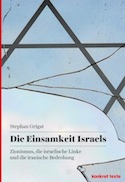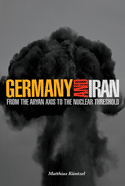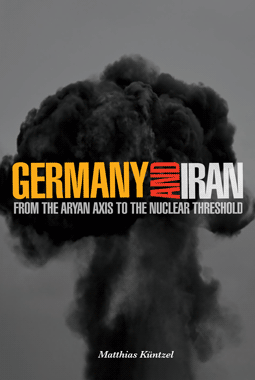By Arno Tausch · Tuesday, May 19, 2015  Die Einsamkeit Israels: Zionismus, die israelische Linke und die iranische Bedrohung (Israel’s Solitude: Zionism, the Israeli Left, and the Iranian Threat), by the German political scientist Stephan Grigat, is an important contribution to the overall debate on the Middle East, and it was published just in time, given the background of the Lausanne negotiations with Iran. Grigat dispels the current euphoria about the “breakthrough in Lausanne” and illuminates the many existing darker sides of the Lausanne deal. The present reviewer is of the opinion that, particularly in view of the special historical responsibility of Continental Europe, a careful reconsideration of the realities created in Lausanne and the considerable role played by the EU foreign policy machinery is necessary and that the other side in the conflict—the side of Israel—is also being heard. Die Einsamkeit Israels: Zionismus, die israelische Linke und die iranische Bedrohung (Israel’s Solitude: Zionism, the Israeli Left, and the Iranian Threat), by the German political scientist Stephan Grigat, is an important contribution to the overall debate on the Middle East, and it was published just in time, given the background of the Lausanne negotiations with Iran. Grigat dispels the current euphoria about the “breakthrough in Lausanne” and illuminates the many existing darker sides of the Lausanne deal. The present reviewer is of the opinion that, particularly in view of the special historical responsibility of Continental Europe, a careful reconsideration of the realities created in Lausanne and the considerable role played by the EU foreign policy machinery is necessary and that the other side in the conflict—the side of Israel—is also being heard.
Continue reading →
By Telos Press · Wednesday, April 22, 2015 Writing at the Times of Israel website, Jeffrey Herf discusses what Günter Grass refused to see about Iran—and why Matthias Küntzel, in his new book Germany and Iran, gets it right.
Continue reading →
By Telos Press · Wednesday, March 18, 2015  It’s a “special relationship.” But unlike the one embraced and enjoyed by the US and the UK, the nature of the relationship between Germany and Iran seems clandestine and sinister, and evokes strong feelings of suspicion and fear. In the new book, Germany and Iran: From the Aryan Axis to the Nuclear Threshold, respected political scientist and historian Matthias Küntzel examines the special connection between the “problem” countries of the past and present, and confronts the key issue of Iran’s achieving nuclear weapons capability and the real threat of danger that reality poses for Israel and the United States. It’s a “special relationship.” But unlike the one embraced and enjoyed by the US and the UK, the nature of the relationship between Germany and Iran seems clandestine and sinister, and evokes strong feelings of suspicion and fear. In the new book, Germany and Iran: From the Aryan Axis to the Nuclear Threshold, respected political scientist and historian Matthias Küntzel examines the special connection between the “problem” countries of the past and present, and confronts the key issue of Iran’s achieving nuclear weapons capability and the real threat of danger that reality poses for Israel and the United States.
Continue reading →
By Mohammad Rafi · Tuesday, March 17, 2015  An often referred to occasion when discussing Iran’s[1] relation to Nazi Germany is the 1939 establishment of a scientific German library consisting of 7,500 books in Tehran. The books were a gift from Nazi Germany as a building block in a continuing collaboration between Iran and Germany. This Deutsche Wissenschaftliche Bibliothek, as it was called, contained a variety of selections ranging from the works of the great German philosophers to books of technological nature. More telling than the choice of books provided is the preface to the library catalog ordered by one of the Nazi’s chief racial ideologues, Alfred Rosenberg. In this text he writes: “National Socialist Germany is consciously devoted to the facilitation of Aryan culture and history and sees in Iran’s efforts a striving towards mutual goals, that are to further the spiritual affinity of both nations” (Vorwort, DWB).[2] This “spiritual affinity” (geistige Verwandschaft) has to be viewed as part of a continuation of successful German cultural work or Kulturarbeit in Iran, which is precisely what needs to be explored to understand how this point was reached. However, we need to look at a part of Germany’s robust cultural efforts in the earlier decades of the 1900s, especially throughout the First World War, to allow us to better comprehend the roots of this spiritual alliance between Germany and Iran. An often referred to occasion when discussing Iran’s[1] relation to Nazi Germany is the 1939 establishment of a scientific German library consisting of 7,500 books in Tehran. The books were a gift from Nazi Germany as a building block in a continuing collaboration between Iran and Germany. This Deutsche Wissenschaftliche Bibliothek, as it was called, contained a variety of selections ranging from the works of the great German philosophers to books of technological nature. More telling than the choice of books provided is the preface to the library catalog ordered by one of the Nazi’s chief racial ideologues, Alfred Rosenberg. In this text he writes: “National Socialist Germany is consciously devoted to the facilitation of Aryan culture and history and sees in Iran’s efforts a striving towards mutual goals, that are to further the spiritual affinity of both nations” (Vorwort, DWB).[2] This “spiritual affinity” (geistige Verwandschaft) has to be viewed as part of a continuation of successful German cultural work or Kulturarbeit in Iran, which is precisely what needs to be explored to understand how this point was reached. However, we need to look at a part of Germany’s robust cultural efforts in the earlier decades of the 1900s, especially throughout the First World War, to allow us to better comprehend the roots of this spiritual alliance between Germany and Iran.
Continue reading →
By Telos Press · Wednesday, February 4, 2015 Writing at the Gatestone Institute website, Amir Taheri reviews Matthias Küntzel’s Germany and Iran: From the Aryan Axis to the Nuclear Threshold, available now from Telos Press Publishing:
In the past 50 years or so, the “special relationship” between Iran and Germany has been highlighted in numerous ways. The first German industrial fair held in a foreign country after the Second World War was hosted by Tehran in 1960 with Economy Minister Ludwig Erhard leading a delegation of over 100 German businessmen. After that, all German Chancellors, starting with Konrad Adenauer, made a point of visiting Iran until the fall of the Shah. Even after the mullahs seized power, Germans pursued the special relationship through high-level visits, including that of Chancellor Gerhard Schroeder. The only time the German Federal parliament approved a law unanimously was when it enacted legislation to guarantee investments in Iran.
Continue reading →
By Telos Press · Monday, November 3, 2014  Telos Press Publishing is pleased to announce that Matthias Küntzel’s Germany and Iran: From the Aryan Axis to the Nuclear Threshold is now available for purchase in our online store. The book is also available in Kindle eBook format from Amazon.com. Telos Press Publishing is pleased to announce that Matthias Küntzel’s Germany and Iran: From the Aryan Axis to the Nuclear Threshold is now available for purchase in our online store. The book is also available in Kindle eBook format from Amazon.com.
Why has the international community failed to prevent Iran from achieving nuclear weapons capability? Why is Germany, even today, the mullahs’ biggest trading partner in the West? What underpins the strange friendship between Germany and Iran that goes back to the beginning of the last century and has survived every war, catastrophe, and revolution?
Matthias Küntzel’s Germany and Iran: From the Aryan Axis to the Nuclear Threshold helps us to answer these questions. By unearthing new evidence from the National Archives in Washington, DC, and the German Foreign Office Archives in Berlin, Küntzel reveals that there has always been a hidden dispute between the White House and the German government over how to tackle Iran, and this dispute has deep historical roots.
Continue reading →
|
|
 Die Einsamkeit Israels: Zionismus, die israelische Linke und die iranische Bedrohung (Israel’s Solitude: Zionism, the Israeli Left, and the Iranian Threat), by the German political scientist Stephan Grigat, is an important contribution to the overall debate on the Middle East, and it was published just in time, given the background of the Lausanne negotiations with Iran. Grigat dispels the current euphoria about the “breakthrough in Lausanne” and illuminates the many existing darker sides of the Lausanne deal. The present reviewer is of the opinion that, particularly in view of the special historical responsibility of Continental Europe, a careful reconsideration of the realities created in Lausanne and the considerable role played by the EU foreign policy machinery is necessary and that the other side in the conflict—the side of Israel—is also being heard.
Die Einsamkeit Israels: Zionismus, die israelische Linke und die iranische Bedrohung (Israel’s Solitude: Zionism, the Israeli Left, and the Iranian Threat), by the German political scientist Stephan Grigat, is an important contribution to the overall debate on the Middle East, and it was published just in time, given the background of the Lausanne negotiations with Iran. Grigat dispels the current euphoria about the “breakthrough in Lausanne” and illuminates the many existing darker sides of the Lausanne deal. The present reviewer is of the opinion that, particularly in view of the special historical responsibility of Continental Europe, a careful reconsideration of the realities created in Lausanne and the considerable role played by the EU foreign policy machinery is necessary and that the other side in the conflict—the side of Israel—is also being heard. 
 An often referred to occasion when discussing Iran’s[1] relation to Nazi Germany is the 1939 establishment of a scientific German library consisting of 7,500 books in Tehran. The books were a gift from Nazi Germany as a building block in a continuing collaboration between Iran and Germany. This Deutsche Wissenschaftliche Bibliothek, as it was called, contained a variety of selections ranging from the works of the great German philosophers to books of technological nature. More telling than the choice of books provided is the preface to the library catalog ordered by one of the Nazi’s chief racial ideologues, Alfred Rosenberg. In this text he writes: “National Socialist Germany is consciously devoted to the facilitation of Aryan culture and history and sees in Iran’s efforts a striving towards mutual goals, that are to further the spiritual affinity of both nations” (Vorwort, DWB).[2] This “spiritual affinity” (geistige Verwandschaft) has to be viewed as part of a continuation of successful German cultural work or Kulturarbeit in Iran, which is precisely what needs to be explored to understand how this point was reached. However, we need to look at a part of Germany’s robust cultural efforts in the earlier decades of the 1900s, especially throughout the First World War, to allow us to better comprehend the roots of this spiritual alliance between Germany and Iran.
An often referred to occasion when discussing Iran’s[1] relation to Nazi Germany is the 1939 establishment of a scientific German library consisting of 7,500 books in Tehran. The books were a gift from Nazi Germany as a building block in a continuing collaboration between Iran and Germany. This Deutsche Wissenschaftliche Bibliothek, as it was called, contained a variety of selections ranging from the works of the great German philosophers to books of technological nature. More telling than the choice of books provided is the preface to the library catalog ordered by one of the Nazi’s chief racial ideologues, Alfred Rosenberg. In this text he writes: “National Socialist Germany is consciously devoted to the facilitation of Aryan culture and history and sees in Iran’s efforts a striving towards mutual goals, that are to further the spiritual affinity of both nations” (Vorwort, DWB).[2] This “spiritual affinity” (geistige Verwandschaft) has to be viewed as part of a continuation of successful German cultural work or Kulturarbeit in Iran, which is precisely what needs to be explored to understand how this point was reached. However, we need to look at a part of Germany’s robust cultural efforts in the earlier decades of the 1900s, especially throughout the First World War, to allow us to better comprehend the roots of this spiritual alliance between Germany and Iran. 


